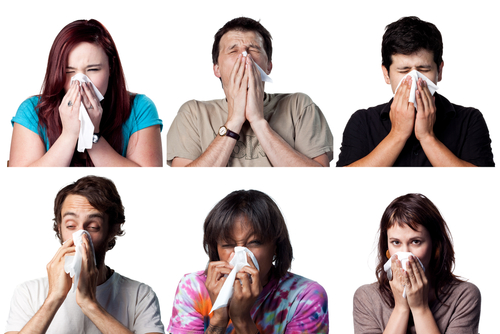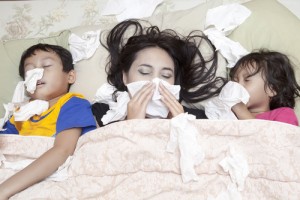 The storytelling begins the morning you wake up with a slight scratch in your throat. Oh, this is nothing, you tell yourself, as if denial was the best antidote to a virus. If I just sip some throat-soothing tea, I’ll be fine.
The storytelling begins the morning you wake up with a slight scratch in your throat. Oh, this is nothing, you tell yourself, as if denial was the best antidote to a virus. If I just sip some throat-soothing tea, I’ll be fine.
When the runny nose starts, you load up on oranges or Fisherman’s Friend and promise yourself an early bedtime. When evening rolls around, your head is on the verge of exploding with mucous. You can try to hit the sack early, but it’s no use. The mucous is flowing fast and furious now, and perhaps you’re coughing too. You’ll get no sleep tonight.
When morning arrives, you’re exhausted and cranky and this is when the next phase of storytelling begins. You need an explanation — what is it, and why me?
Without a bunch of lab tests, you won’t find any certainty. But that’s ok, because you’ll invent an explanation that at the very least feels true. Oh, it’s that flu that was going around at work. I must have caught this from that coughing bastard on the plane. Obviously, my husband’s little cold mutated into this nasty flu.
I truly believed that last one. Or did, until I ran it by William Schaffner, an infectious diseases specialist at Vanderbilt University School of Medicine. My husband had come down with a minor cold, and a couple days after he’d recovered, my throat started feeling scratchy. Then I became hoarse, feverish and achy all over. I developed a dry cough and felt like wet spaghetti, Schaffner’s hallmark symptoms of the flu. At the low point, I recalled that even healthy people can die of influenza and wondered if I should write a will. I was sure my dear husband Dave had given me this bug, but he insisted that since our symptoms were different, it wasn’t his crud.
I called Schaffner hoping he could resolve our little marital dispute, but it turns out that tracing the person-to-person spread of these viruses is difficult even for scientists. Sure, if your spouse or child comes down with something and 24 to 72 hours you do too, it’s a good bet you got it from them. This would seem to implicate my husband.
But it’s just as feasible that I caught my flu somewhere else. It’s almost impossible to trace the origin of colds and flus on a case-by-case basis, Schaffner says. The problem is that unless you’re living as a hermit, most of us come into contact with a lot of people, and there’s no easy way to tell which of them are vectors. People start spreading a cold or flu virus before they know they have it. The day before you feel sick, you’re already exhaling and excreting the virus, Schaffner says.
Which means that while you’re blaming the cougher in the seat next to you on the plane, it might have been the as-yet symptomless flight attendant who actually infected you. Maybe I got my flu from Dave, or maybe it was the bagger at the grocery store or my not-yet sick neighbor. In retrospect, it’s entirely plausible I caught it out and about, since a flu with my characteristics struck many others in my community.
 My pet hypothesis — that I had a version of Dave’s virus that his robust immune response had mutated into something stronger — is probably wrong. While these viruses evolve, it’s rarely that fast, Schaffner says. What’s more likely, he says, is that my husband and I reacted differently to the very same virus. People don’t get sick in the same way. Everyone’s immune system is unique, and a virus that Dave has built some immunity to may be more novel to my immune system.
My pet hypothesis — that I had a version of Dave’s virus that his robust immune response had mutated into something stronger — is probably wrong. While these viruses evolve, it’s rarely that fast, Schaffner says. What’s more likely, he says, is that my husband and I reacted differently to the very same virus. People don’t get sick in the same way. Everyone’s immune system is unique, and a virus that Dave has built some immunity to may be more novel to my immune system.
Some people become infected with a cold or flu virus and never develop symptoms, yet they still shed and spread the illness. Because they feel fine, these invisible vectors are out passing the virus along without even knowing it. This is one reason Schaffner and the CDC urge everyone older than six months to get a flu shot. While the people most vulnerable to influenza — the elderly and people with compromised immune systems, for instance — get a lesser response to the flu vaccine, their chances of encountering the flu virus go down if the healthier people around them are immunized.
But the flu vaccine is far from 100 percent effective, so the best strategy for prevention is an obsessive attention to hand hygiene. Wash your hands frequently with soap or a hand sanitizer and avoid people who are sick. And children. Especially children. “Every new parent makes this observation at some point,” Schaffner says. “Kids are the great disseminators in our communities.” Because these viruses are new to their immune systems, kids put out more virus for longer than adults do, Schaffner says. “They’re also less hygienic and more likely to jump in your arms and give you wet kisses.” Of course, sometimes those hugs are well-worth the sniffles.
Images by Shutterstock.com.
Reading this made me feel super queasy.